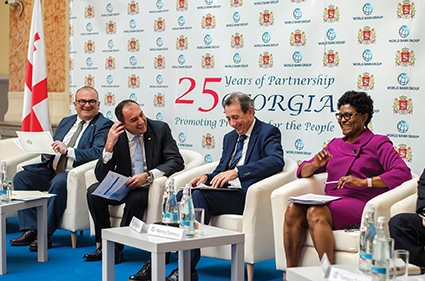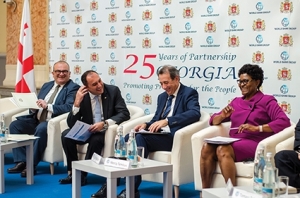World Bank Celebrates 25th Anniversary of Partnership with Georgia
On September 15, World Bank Group celebrated the 25th Anniversary of its partnership with Georgia, with a forum entitled: ‘Boosting Georgia’s Development: From Top Reformer to Top Performer’ held at the National Parliamentary Library of Tbilisi, with a panel discussion focusing on the past, present and future prospects of the economic development of the country. Present were World Bank Regional Director for the South Caucasus, Ms. Mercy Tambon; World Bank Regional Vice President Mr. Cyril Muller; World Bank Chief Economist for Europe and Central Asia, Mr. Hans Timmer; Mr. Tomasz Telma, Director Europe and Central Asia from International Finance Corporation (IFC) and members of the Georgian government.
“Georgia is a success story of resiliance. From a turbulent period, through its independence, to a vibrant, middle income country today… the World Bank Group has always been by its side through good times and bad,” Mercy Tambon said in her opening speech, noting that the forum is an opportunity “to look back and celebrate our joint accomplishments”. She also took the opportunity to thank all those without whose commitment and dedication to develop Georgia, we “would certainly not be where we are today”.
Ms. Tembon noted that Georgia is still facing challenges today, with more than 20% of the population still living on the poverty line and many unable to complete school or find employment. “We must now look into the future and reflect how we can tackle these remaining challenges”.
“This celebration is particularly important to me because the country we are in today is very different from the one I visited in 1994 when I had a great honor to be one of the first group staffers to visit and work in Georgia,” Cyril Muller, said. “I’m very pleased to say that Georgia prevailed and suceeded in becoming an economy that is striving,” he added.
Over the past 25 years, the World Bank’s financial commitment to Georgia amounted to $4.3 billion dollars across various sectors supporting the country’s social and economic development.
“While Georgia has made remarkable progress over the last 25 years, many challenges remain,” Mr Muller said. “Specifically, we see four areas for enhancement that will help Georgia expand its achivements into the future. The first is to unlock the productivity growth potential of firms by accelerating the shift from inward-looking to export-driven growth. Second, it is about removing the constraints on social mobility by investing in people and skills creation, particularly in the rural economy. Third, managing the environment’s natural resources, and fourth, ensuring that the micro-economic environment remains supportive and builds resilliance against external shocks. With the right policies, Georgia can maintain and double its GDP per capita by 2030. It can by that time eliminate extreme poverty and build a country where the middle class is the majority of the population,” the Regional Vice President said.
Dimitry Kumishvili, First Deputy Prime Minister, Minister of Finance, spoke in detail about the government’s Four Point Reform Plan which which is fully supported by the World Bank. He underlined the importance of the Georgia National Innovation Ecosystem (GENIE), financed by the World Bank with a $40 million loan, and emphasized the importance of the IFC initiative on issuing denominated bonds in Lari for the private business sector.
“The general rule is that countries are successful over a sustained period if they change consistently, adjusting to a changing environment,” Mr Timmer said, sharing his thoughts on the external environment for Georgia in a globalized economy, and the opportunities it offers. “To prepare for the future, I think it’s important to realize that the regional economy and the economy of neighboring countries has changed dramatically over the last three years; the global economy has changed over 10 years,” he said, highlighting that Georgia would have to adjust to the new opportunities in the context of new environment, making use of the skills and new technologies, and finding new markets to export.
“Georgia’s biggest asset is its people, its human capital. We are now in a world where the job market is completely different from what it was five or ten years ago,” Ms. Tambon said. “By unlocking its human capital, Georgia will be able to integrate into the global economy”.
Minister of Education Aleksandre Jejelava talked about the education reforms planned and the challenges of secondary, high and vocational education in Georgia.
“We believe we’re mobile enough to rebuild our education system in a very short time; we believe that withinin four years, we’ll be able to achieve significant difference in all components of education. We’re in the process of changing the education plans, something we believe will drive our youth towards the right skills and towards the motivation to learn,” he said.
“In private sector development, Georgia already is a success story,” Mr. Telma, said, elaborating on the business-friendly private sector environment in Georgia and the progress it has been making. However, he noted that lack of access to finance, despite the very strong banking sector, is still obvious.
“From our perspective, it’s about increasing private sector participation in infrastructure development; it’s a key for many parts of the economy and it’s obviously important for the government which is experiencing some fiscal challenges and constraints,” he said, noting that Georgia has to increase the quality of its labor force in order to attract more foreign direct investment.
“All reforms carried out aim to make the private sector more competitive and stronger. The capital market reform is very important in this regard, as is the pension reform,” Mr. Kumsishvili commented.
“We’ll be putting in place new reforms soon, with one of the priorities being installing commercial chambers within the common court system of Georgia, so that every investor and businessperson in Georgia can be confident about court litigations,” Tea Tsulukiani, Minister of Justice of Georgia, said.
“Infrastructure itself is challenging enough, and the challenge is to make sure it serves the purpose in the right way and allows us to unlock the growth economic potential, and that we’re be able to couple infrastructure investments with smart regional policies in such a way that this potential starts working immediately to a full extent,” said Irakli Matkava, First Deputy Minister of Regional Development and Infrastructure.
Nino Gugunishvili
Related stories
Georgia: From Top Reformer to Top Performer
New IFC Partnership in Georgia to Help Save Water, Conserve Power











